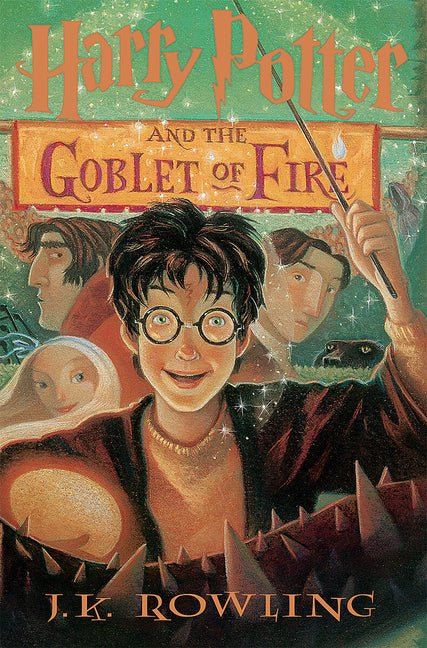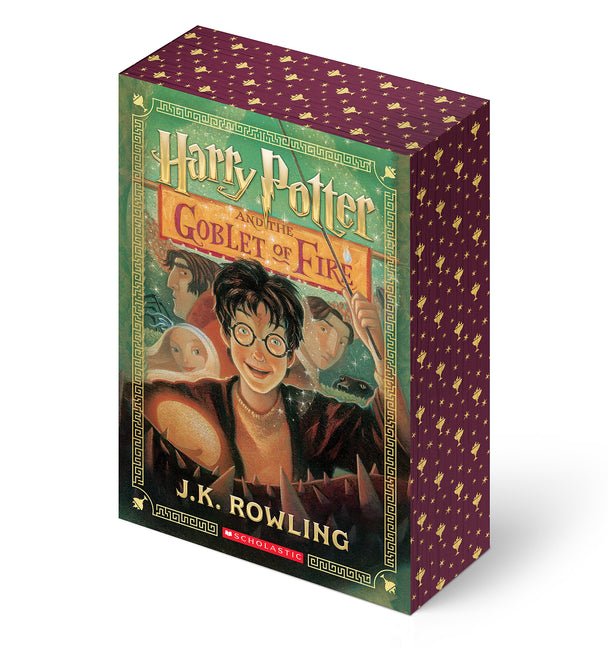Scholastic
Harry Potter and the Goblet of Fire: Volume 4
Couldn't load pickup availability
Harry Potter wants to get away from the pernicious Dursleys and go to the Quidditch World Cup with Hermione, Ron, and the Weasleys. He wants to dream about Cho Chang, his crush (and maybe do more than dream). He wants to find out about the mysterious event involving two other rival schools of magic, and a competition that hasn't happened for hundreds of years. He wants to be a normal, fourteen-year-old wizard. Unfortunately for Harry Potter, he's not normal; he's different -- even by wizarding standards. And in this case, different can be deadly.
Share
Book Details
ISBN:
9780439139595
EAN:
9780439139595
Binding:
Hardcover
Pages:
752
Authors:
J K Rowling
Illustrators:
Mary Grandpré
Publisher:
Scholastic
Published Date: 2000-01-08
View full details

I enjoyed HARRY POTTER AND THE GOBLET OF FIRE, but the book really brought into stark relief how glad we all should be that we're not wizards:Fighting each other:The most potent spell the wizards have is the Avada Kedavra spell, which kills and supposedly has no defense. It is cast through a device (a wand) and can kill one victim at a time. Muggles have machine guns, nuclear weapons, and poison gas. Muggles are better in this regard. Advantage: Muggles.Transportation:Wizards have flying brooms, floo powder, port keys, flying carpets, the aparate teleportation spell, a flying car, and the Hogwarts Express. Muggles have airplanes, cars, and trains. As far as I can tell, muggles are much better at transporting groups of people. The Hogwarts Express does not seem to be any more efficient than a muggle train, except in that it leaves on time. Airplanes seem safer and easier than port keys, which require elaborate preparation to essentially be used once or twice. Flying carpets are essentially off-limits to the wizards of England, leaving family transportation options limited to floo powder and brooms, both of which are shown to be dangerous in the Potter books (Harry uses floo powder incorrectly and ends up in a dark wizard shop, while Quiddich players are frequently falling off their broom sticks and getting hurt). The wizards have a clear advantage with the aparate teleportation spell, but it too is of limited use (for instance, it can't be used to get in or out of Hogwarts). Advantage: draw.Medicine:This is the one area in which wizards have an undisputed advantage. Injuries can be healed almost immediately and nobody ever seems to get sick. However, just as diseases become more resistant and harder to treat in the muggle world, so too with wizards. Lycanthropy cannot be cured, and the use of unicorn blood to stave off death creates a weakness and addiction of sorts. Voldemort's self-medication usually involves hurting someone else to stay alive, the Sorcerer's Stone artificially prolongs life but also had negative social consequences. We don't know about wizard public health, although British muggles have access to universal health coverage. Still, the wizards seem to have the upper hand here. Advantage: wizards.Education:Wizards go to school for seven years and learn about magic. Muggles go to school for upwards of 20 years or more and learn about their world. Potions and chemistry are about on par. After four years of transfiguration, physics seems more useful. Most of the other wizard topics may or may not be more useful than their muggle equivalent, but the way they are taught dwarf the problems with the muggle education system. The history of magic is taught by a boring ghost and seems to be absorbed by only one student (Hermoin). divination is acknowledged by most of the faculty to be a sham topic. The rotating defense against dark arts teachers are either ineffectual, dangerous in themselves, or chased out of Hogwarts due to prejudice and hatred. Teaching handling of magical animals is entrusted to Hagrid, apparently out of sympathy, who doesn't know how to teach (a year is wasted on bloberworms, another on blast-ended skewts). Exams are cancelled as a "reward" for good behavior. It is not clear where "pure blood" wizards learn how to read or learn about math, but it is clear that they don't learn much about the muggle world, its science, history, or culture. They seem to have more fun, but so what? The product of their education system is a society is dominated by dark wizards and oblivious bureaucrats. All of this is at what is supposed to be the very best wizard school. Advantage: muggles.Government & criminal justice:The Potter books do not present enough information to render a definitive judgment, but it appears that the wizard world, at least in Britain, is ruled by a totalitarian government. The Minister of Magic is appointed, not elected. There is no separation of powers between the bureaucracy and the judiciary and there is no evidence of a legislative branch. The Ministry regulates nearly all facets of life, including the press (although the lack of press freedom becomes more clear in the 5th book). Harry is watched by Big Brother so closely that he cannot escape the eye if magic is illegally used in his house. Prisoners are unceasingly tortured by dementors. Corruption and inefficiency is also prominent - death eaters hold key positions because, although fingered as such were never convicted, while innocents like Sirus Black were condemned. Discrimination is openly practiced against giants and werewolves, and house elves are actually enslaved. Certainly some muggle countries are just as bad, but most industrial nations including Britian seem better off. Advantage: muggles.Result? Muggles zap wizards, 3-1-1.
_Harry Potter and The Goblet of Fire_ gripped me from the opening scene at the Riddle House (like so many of Rowling's creations, very aptly named) to the end-of-year parting at King's Cross Station. Though the book's length may give rise to caution among those wary of sequels, J.K. Rowling has by no means succumbed to the diarrhea of the pen too often found in writers of multiple bestsellers. Like the previous three Harry books, "The Goblet of Fire" is well paced and tautly structured. It really does require all 734 pages of the American edition to tell the whole intricate story, or rather, as much of the story as the author will reveal at this time.In book four, Rowling (intentionally or not) gives a nod to many questions large and small posed by her fans. We learn who does the cooking and cleaning at Hogwarts, what happened to Neville Longbottom's parents, how to pronounce "Hermione," where other schools of magic may be found, and what Dumbledore can really be like when he's angry. We learn more about Hagrid, the Malfoys, and Snape (one of the most interesting developments is a hint that Snape's relationship with Harry may undergo a change for the better in the future). Along with Harry, Ron, and Hermione, we learn of hexes and curses and defenses against the Dark Arts. And always, Rowling manages to weave together the least details and most seemingly unrelated subplots into a whole that is cohesive, uncontrived, and satisfying - though leaving the reader wanting much more. At about page 600 I found myself very sorry that there were only 100-some pages to go, because I knew that this would be all I would have until book five. I haven't felt that way about a book since hearing Sam Gamgee say "Well, I'm back," and wishing I could keep following him, Frodo, and their friends through more adventures in Middle-earth.The much-discussed first forays into romance for the leading characters are lightly and deftly handled, and while important are certainly not a main focus of the book. The effect of the romance subplots is to show how Harry, Ron, and Hermione are growing up and beginning to see themselves and one another in new ways. Along with romantic yearnings, they begin to exhibit other changes: Ron becomes edgier and more outspoken, Hermione learns to shrug off ridicule and be less rule-bound, and Harry continues to develop the bravery and valor of his parents - and of his House's founder, Godric Gryffindor.Harry's biggest challenges so far, not surprisingly, come in this book. Instead of flying in Quidditch matches, he is involved in an important year-long event that has temporarily superseded Quidditch at Hogwarts. The challenges he overcomes in the course of this event form the core of the book. Woven into the story are Lord Voldemort and his servants, and their attempts to bring He-Who-Must-Not-Be-Named back to full life and power. Mysterious disappearances and even a death or two in "The Goblet of Fire" have, as in any good mystery story, more than one plausible suspect; and, as with any good mystery story, the solution ultimately eluded my several attempts at deductive reasoning - though the clues are present.Death casts a shadow over book four, particularly in the final chapters, where the usually boisterous end-of-year banquet is quite somber and the conclusion of the special year-long event is robbed of its triumph. But as Rowling told The Times, "if you really are honestly going to examine evil actions then you have a moral obligation not to fudge the issue." Her handling of murder in this book is sensitive and not, I think, likely to engender nightmares in young readers; as Rowling promised, it is "upsetting but not damaging."I can't say the book was completely perfect. Some minor flaws exist: Harry innocently poses a question to which he should well know the answer from a previous book; he convenient overlooks a recently-learned spell that could easily resolve a certain difficulty; he witnesses a magical effect in which the results come somewhat out of order. In addition to noting these minor errors, I was a bit dissatisfied with the way the ending of the year-long event was handled - I would have liked a bit more pomp and ceremony and a bit more official attention to the tragedy of the death that occurs. However, I can see why Rowling ends the year at Hogwarts on a quieter note than usual. One very good result of this is that Harry is given time and space to recover from his ordeals, which is a refreshing change from the usual adventure series in which the hero bounces from crisis to crisis with no time to absorb, reflect, or grieve.Time and re-reading will certainly offer me new perspectives on "The Goblet of Fire." But meanwhile, I'm glad to say that this is an excellent addition to the Harry Potter stories and one I will certainly read again and again - while waiting eagerly for book five! I highly recom...
Exactly what I wanted
Got these books for my 10 year old nephew who is officially a Potterhead and he loves them! Books are inexpensive and durable so that he can read them and save them for his little sisters to enjoy when they are old enough.
The books in this series are timeless; I read the first one to my daughter when she young, then we continued with each book in the series,I’m nearly 60, but I love escaping to Hogwarts.


